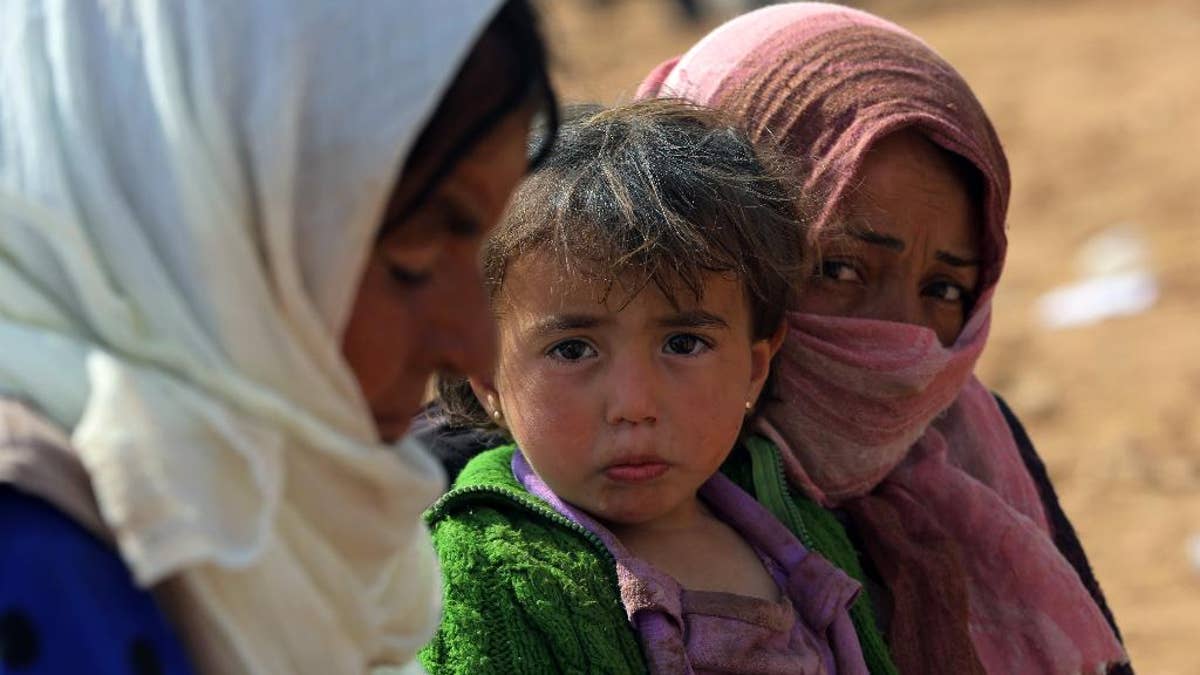
Syrian refugees, mostly Kurds from Kobani, rest after arriving at the Turkey-Syria border near Suruc, Turkey, Saturday, Sept. 27, 2014. (AP Photo/Burhan Ozbilici) (The Associated Press)
On the walls of a Lebanon community center for Syrian refugee children hang the crayon-colored drawings of life back in Syria.
Like the drawings from our own children and grandchildren we hang on the fridge, these drawings feature children playing, flowers, swing sets, and toys.
But these children were born shortly before the start of Syria’s civil war, five years ago this month, so along with the flowers, they feature rockets, soldiers shooting, and—horrifically— bodies of family members dead on the street with blood pooling beside them.
Perhaps just as horrific is that Westerners are now turning cold toward Syria’s refugees. In a Stockholm train station, a group of masked men rampaged through threatening and beating refugee children. As they migrate across Europe, Syrian women report rampant sexual abuse. Border guards routinely beat refugees – or worse.
Surgeons at hospitals on the Syrian-Turkey border report some two cases a day of refugees being shot trying to cross the border, including a one-year-old baby and a 10-year-old girl.
As evangelical leaders in the U.S., we are concerned about the growing hostility toward refugees. That’s why we are calling on Christians of all stripes to do the one thing that has the power to change this dynamic: pray.
Prayer is desperately needed. This year may see more refugees attempting to reach the relative safety of Europe, as violence in Syria shows no sign of abating.
Already in the month of January more than 62,000 migrants arrived in Greece, compared to less than 1,500 in January of 2015. This year, more than 272 people died trying to get to Greece, including at least 60 children.
In other words, we are in the heart of this crisis. It may yet grow worse. Millions of Syrian mothers, fathers, and children are still in desperate need.
Prayer has been ridiculed of late as an ineffectual response to tragedy and urgent physical needs. We disagree. Action that leads to systemic change starts with prayer.
We cannot love our neighbors at the same time we’re standing aside and idly watching them be slaughtered. The Bible commands us to take up the cause of the innocent and the defenseless, and the first place we ought to turn to for justice is our Lord himself. Anything less is not a sufficiently Christian response.
Prayer was central both to the civil rights movement as well as personally to Martin Luther King, Jr. He took numerous personal prayer retreats, led the 1957 Prayer Pilgrimage for Freedom, and he understood prayer as “a way of motivating, affirming, reaffirming, empowering people in the context of the struggle for equal rights,” according to his biographer. And following a threat on his life in 1956, King turned to God in prayer and received a profound sense of encouragement to continue in the struggle.
As Dr. King’s experience illustrates, prayer accompanies our own action. In fact, God says he won’t even listen to our prayer unless our own hearts and hands are aligned with God’s.
We cannot fool ourselves into thinking God does not see how we respond to those in need. Will we see the image of God in the most vulnerable? He says, “Seek justice. Defend the oppressed. Take up the cause of the fatherless; plead the case of the widow." (Isaiah 1:18-19) Then God will hear our prayers.
Some of these refugees are Christians fleeing persecution. We cannot forget our brothers and sisters in peril. What’s more, we cannot seal ourselves off from our mission field. Perhaps an entire generation of those fleeing genocide will see Christ in our compassion and be compelled by His grace.
That is why we are calling on American Christians to pray for Syria. A World Vision survey last October found that only 30 percent of committed Christians had prayed for Syrian refugees.
That needs to change. Evangelicals will continue to have robust disagreement on the exact nature of refugee and immigration policy.
But one thing that unites us, despite our differences, is the belief in the power of prayer.








































